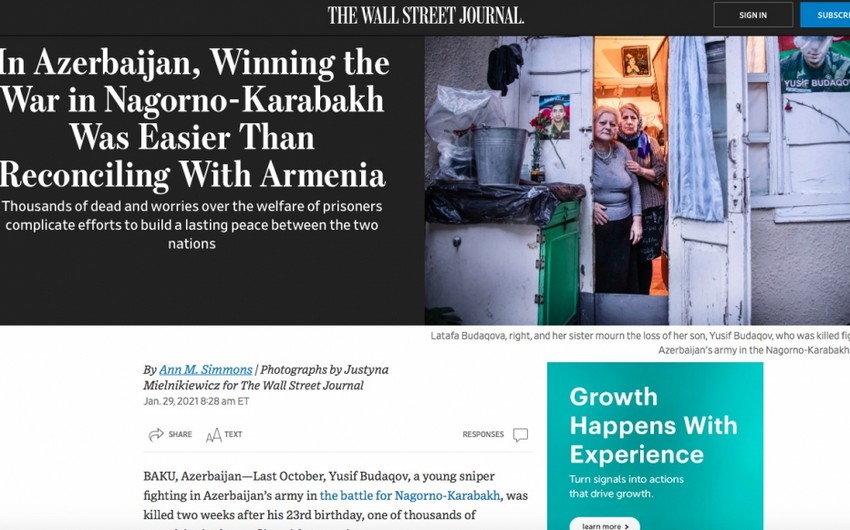The Wall Street Journal has published an article headlined, 'In Azerbaijan, Winning the War in Nagorno-Karabakh Was Easier Than Reconciling With Armenia.'
Report informs that, written by Ann Simmons, the article is dedicated to the Armenian-Azerbaijani conflict and the outcomes of the war in which Azerbaijan managed to regain control over its territories.
According to the author, thousands of dead and worries over the welfare of prisoners complicate efforts to build a lasting peace between the two nations.
Last October, Yusif Budaqov, a young sniper fighting in Azerbaijan's army in the battle for Nagorno-Karabakh, was killed two weeks after his 23rd birthday, one of thousands of casualties in the conflict with Armenia. There is little prospect of reconciling with Armenia now the fighting is over, his mother, Latafa Budaqova, told the author of the article.
"It's not possible," she said. They "came to our land and our children are dead because of them."
The author notes that Nagorno-Karabakh is internationally recognized as part of Azerbaijan but was controlled by Armenians for almost three decades.
According to the article, last fall, Azerbaijani forces regained control of its territory.
"A subsequent truce brokered by Russia in November aimed to end the dispute over the mountainous enclave for good. But the scale of the losses on both sides and deep-seated enmity make it difficult to move on and rebuild the shattered province," the author says.
Some 2,855 Azeri soldiers were killed during the six weeks of fighting that erupted on Sept. 27, according to the country's Defense Ministry. Armenian authorities say more than 3,000 of their troops died, while the total number of civilian casualties was around 150, according to official tallies from Armenia and Azerbaijan.
The article notes that many Armenians have already called on Prime Minister Nikol Pashinyan to resign for having conceded to the truce, condemning it as an act of capitulation. Members of the Armenian diaspora in the U.S., Europe, and elsewhere have called on Azerbaijan to grant equal rights and protection for Armenians who might opt to return to areas now under Azerbaijan's control. However, for 30 years, the Armenian side avoided similar talks about the return of the Azerbaijani population to their homeland.
Hikmet Hajiyev, chief policy adviser to Azeri President Ilham Aliyev, acknowledged that finding common ground is challenging, but the two sides have already agreed to work together to revive Nagorno-Karabakh's tattered economy and strengthen trade and rail links, an important component of the peace deal.
"In any military operation, winning the war is sometimes much easier than winning the peace," Mr. Hajiyev said.
The deputy prime ministers of Armenia, Azerbaijan, and Russia are expected to meet in Moscow on Saturday to begin discussions.
Ali Hajizade, a political analyst in Baku, said that without reconciliation between ordinary Azeris and Armenians, sustainable peace would be impossible. "This is an achievable goal, but this is not possible now," he said.
Azerbaijan appears to have the upper hand in the peace process. Funded in part by oil wealth, its military capability is vastly superior to that of Armenia. Reclaiming territory lost to Armenia during the collapse of the Soviet Union has long been a goal for its leaders, and enthusiasm for its territorial gains in Nagorno-Karabakh is palpable.


 https://static.report.az/photo/04897767-ad78-3621-abad-30d037a0cf0c.jpg
https://static.report.az/photo/04897767-ad78-3621-abad-30d037a0cf0c.jpg

